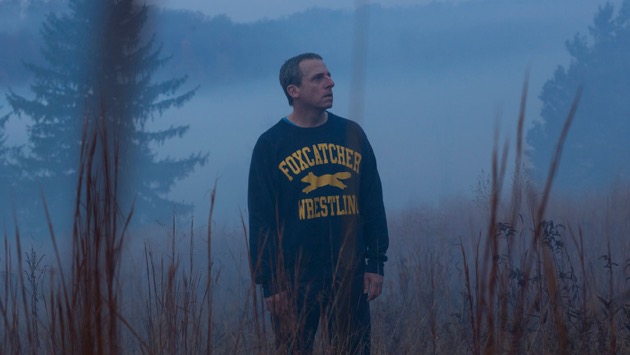Anatomy of a Scene - Foxcatcher

The end of a character’s life is so important. We’ve watched hundreds of heroes die over the years, brought down in the line of duty in a noble sacrifice to save others, gasping out a final message before they finally succumb to mortal wounds. Death in movies is often very clean, very romantic almost in its depiction. But occasionally reality creeps in and death becomes something ugly. In Foxcatcher, we watch the descent of two men into shadows of their former selves. Promising Olympic wrestler Mark Schultz who will do anything to win, and enigmatic millionaire John DuPont, a man who has everything he could need, but nothing that he wants.
You see the two men spiraling around the drain as Mark’s brother Dave desperately tries to pull him out and guide him towards the gold. It is a movie about determination and passion and that is what makes this scene so amazing.
At the climax of the film, we watch John DuPont kill Dave Schultz. The movie is a true story, so it’s an action that we can all see coming a mile away, but the execution is what makes it special. I like to talk about tension, and this slow build is a masterclass in creating it as we wait the entire movie for the pot to boil over and these two men to collide. It’s an amazing movie capped off with a chillingly real shooting with none of the glamour of Hollywood, instead leaving a man screaming on the ground while his family is forced to sit and watch.
It is an intensely quiet scene, snow and rock crunching on the ground as the car slowly roll up to Dave’s house. No music plays, and the few sounds you do hear are natural, and stand out so much. The car awkwardly jerks as it slowly turns around in the driveway, stopping and reversing until it is pointed back the way it came. Inside sits DuPont and a bodyguard. DuPont rigidly sits behind the wheel, his face a mask. He looks like he does every other time that we see him, and nothing betrays his true intentions.
He is not a confident man, and years of living at the top have acclimated him to getting whatever he wants. He has a giant estate, employs dozens of people, yet he isn’t happy. He isn’t close to anyone. Dave is the complete opposite. He has a wife and child. He’s kind and compassionate. People respect him and follow him as a natural leader. He is everything that DuPont is not, and everything that he wishes he could be. You can see it in the way that he drives up. Where DuPont is stiff and emotionless, Dave is is sitting in his car, working on it with a toolbox on the ground. Dave is independent, whereas DuPont has people waiting on his every need. Dave leads a team and has a loving brother, where DuPont tries to buy respect.
DuPont is fundamentally alone in the world. He has so many people around him, but he connects to none of them. Even after his mother died, he was emotionless, broken, focused only on wrestling. The only person he can connect to is Mark, and their implied homosexual relationship changes the dynamic between them. Mark bleaches his hair and starts snorting cocaine, and his performance suffers. It takes Dave to snap him out of this and bring him back. But this relationship brought DuPont a modicum of happiness that he has not found in a long time. He feels threatened by the easy-going, charming Dave, who manages to be “normal where he feels that he is not. Dave is the picture of a good family man contrasted against the older single man who lives with his mother and is deeply in love with a 28-year old employee of his.
“Do you have a problem with me?”
It is such a loaded question, hanging in the air between the two men. Everything else fades out from around them, and the camera focuses on DuPont. We’ve borne witness to his fascination with weaponry throughout the film, but the appearance of the snub-nosed revolver is still a shock. It changes the conversation. Dave was happily greeting his boss, but now it is different.
DuPont wants to be who Dave is. Strong, kind, but more importantly “normal”. He cuts off his pleasant attempt at a greeting with the cold barrel of a gun. He is in control of the situation, and for once, Dave is awkward. He tries to stammer something out, say anything to appease him, but it doesn’t work. The hammer is cocked, and a moment later a shot is fired.
That moment lasts a lifetime. There is a determination here, an inevitability of violence that the film has been building to over the entire runtime. The world is shattered from stillness to action with this one shot. The security guard scrambles out of the car and the camera cuts to the kitchen where Dave’s wife wonders what is wrong. But Dupont’s face remains unchanged. As she comes out the door, “John, no!”
The camera cuts back to Dupont, and he fires another shot into the back of Dave. He swings the gun at her as she scrambles out the door. This is a conversation between these two men, and the callousness with which he shoots him again on the ground is chilling. His face is empty, emotionless. The camera focuses on him and Dave in turn.
DuPont’s face stays empty. There is just anger and acceptance of what he has just started, what he must finish. The path he has driven down is one that he is now stuck on. For a split second he seems to waver, his gun appearing to retreat into the vehicle as Dave crawls on the ground towards his house, gasping and groaning in pain. Look stains the white snow around him, and his jacket bears two ugly holes where the bullets pierced him.
The gun comes back out and a third shot barks angrily.
Dave stops moving. DuPont sits back in his seat and pulls away. It is over. He has proven himself as stronger, but what has really been accomplished?
45 seconds after he pulls his car up, he has left. A shocked security guard crouches with a pistol out, unsure at what to do. A woman stands in her kitchen and phones for help while her husband lays dying in the snow outside. The music finally kicks in. It is all over. Their world has been shattered. This single moment of brutal silence will come to define the legacy of these men and their families. It’s the age old story of the jilted lover, of the man who feels he has had everything taken from him lashing out at the person who has something. It is a tragic scene, and it manages to remain powerful even though we knew this was going to happen. There are no secrets in this movie, but the way in which the facts we already know are revealed helps define it as a true piece of art.
_____________________________________________

Tom has been writing about media since he was a senior in high school. He likes long walks on the beach, dark liquor, and when characters reload guns in action movies.
You Might Also Like:
The Christ FigureAnatomy of a Scene - Sicario
Anatomy of a Character - Pulp Fiction
_____________________________________________